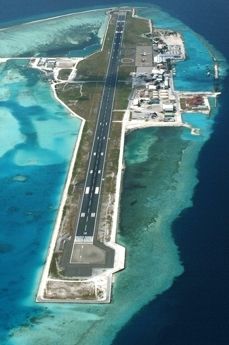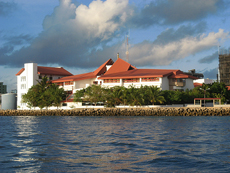Parliament has sent the Penal Code back to the special committee tasked with revising it with a majority of 61 votes. While three members voted against re-sending it to committee, two abstained from the vote.
The final draft submitted to the parliament floor was rejected by 36 votes out of the 72 members present in Sunday’s session, after which a vote was taken whether to send it back to committee for review.
Members from the government coalition parties voted against the bill, with Progressive Party of Maldives (PPM) MP Ahmed Mahloof confirming to Minivan News today that a coalition whip-line was issued for the matter.
The Penal Code was submitted to the floor after seven years of review in the committee, having been initially submitted in 2006.
Maldivian Democratic Party (MDP) MP Ahmed Hamza – Chair of the Penal Code review committee – stated that the reason for the long duration of review is primarily due to the long periods required for reviewing and commenting by state institutions including the Attorney General’s Office and the Ministry of Islamic Affairs.
The bill, if ratified, will replace the 52 year old penal law which is currently in effect.
The Penal Code and religion
 Much of the arguments presented against the Penal Code revolved around the concepts of religion and Sharia law not being “sufficiently reflected” in the final draft.
Much of the arguments presented against the Penal Code revolved around the concepts of religion and Sharia law not being “sufficiently reflected” in the final draft.
Jumhooree Party (JP) MP Ibrahim Muhthalib stated that “no human being has the right to rephrase divine laws in Islamic Sharia into separate articles in a law” and that he would abstain from voting on the matter as some scholars believe that participation in such an act may be blasphemous.
Maldives Development Alliance (MDA) MP Ahmed Amir echoed Muhthalib’s concerns and added that penalties on crimes which have a hadd [fixed punishments specifically mentioned in the Quran] sentences in Sharia Law are what most people have found concerning about the bill.
MP Ibrahim Riza who voted to send the bill back to the review committee said that the bill included some penalties which contradicted Sharia law mandates.
Religious conservative Adhaalath Party Sheikh Ilyas Hussain has also previously in March criticized the bill in sermons saying it will “destroy Islam”, prompting a parliamentary inquiry.
“If it is passed, there is no doubt that there will be no religion in this Muslim society that claims to be 100 percent Muslim. There will be no Islamic punishments. Refusing to incorporate even a single hadd is destroying Islam,” he had said then.
However, presenting the bill to parliament today, Hamza stated that in light of academic and technical expertise of the committee members, irreligious effects in the penal code have been brought to a minimal level.
“We are aware that various scholars from around the globe have commented on this work by Professor Paul Robinson,” Hamza said, referring to the legal expert from University of Pennysylvania Law School, under whose leadership the first draft of the Penal Code had been prepared on the request of then Attorney General Hassan Saeed in January 2006.
“Keeping this in mind, we took care to use our academic and technical capacity to minimalize any irreligious effects that might have been in this bill’s initial draft. Man-made laws are always less perfect than divine laws,” he stated.
The other main reservation put forth by members is the short period of time given to review the bill and submit amendments in.
The committee opened up the draft for amendments from December 24 to 26. On Saturday, December 28, the committee announced that no amendments had been submitted within the given timeframe.
Dhivehi Rayyithunge Party (DRP) MP Abdulla Mausoom, JP MP Shifaq Mufeed, PPM MP Ahmed Nihan voiced concerns about the short period of time given for review when speaking to Minivan News today.
Mausoom said that besides the time limitation, he also noticed double penalties for the same offence in the bill, and that is why he voted to return the bill to parliament.
“The penal code is as thick as a generic A4 ream of papers. It is unrealistic to ask us to read and comment on it in such a short time. What we have now is a penal code that has existed for very many years. When we pass a new one, I do not wish it to be one that calls for amendments to be submitted every other day. We are not of the mindset that we want to reject it, but we want enough time to review it in light of the Maldivian people’s way of life, Islamic Sharia and existing laws,” Shifaaq stated.
Meanwhile Nihan described the bill as “a rushed job done to bring an end to years of it being pending in committee”.
“There isn’t a single member in the committee who has actually read this bill. How can anyone spend time on it when there are so many other important bills that also call for our attention, as well as the annual budget? It has to come with enough time allowance for us to submit amendments,” he stated.
Bill review
The review committee’s Chair Hamza maintains that the government was given sufficient time and opportunity to submit all and any desired amendments to the bill.
all and any desired amendments to the bill.
“Voting records show that it was members of the government coalition who rejected this bill. We provided sufficient time allowances for them to submit amendments. We have even included 12 of the amendments submitted by the Attorney General,” Hamza explained.
“In fact, we worked at length both with former Attorney General Azima Shakoor and current successor Mohamed Anil. We also gave opportunities for political parties to submit amendments, where even PPM sent in submissions. I do not understand why it was rejected after all of this. I am astounded. I sincerely hope the government will explain its reasons for rejecting the bill in the form of an official statement,” he continued.
“I do not see how it will be possible to ever pass the new Penal Code if it is to be left as everyone’s lowest priority. Members need to make time and work to pass this bill at the earliest. I have now scheduled a meeting of the committee for tomorrow. I personally hope to review this, open it up for amendments, incorporate what we will from those and have it resubmitted to the parliament floor by early March next year,” Hamza said.
Responding to members’ criticisms, Hamza pointed out that members had not asked for additional time for reviewing the bill during today’s parliament session, and had instead voted to return it to committee.
 Budget Review Committee Chair Gasim Ibrahim – who himself proposed 14 amendments to the budget – responded to Yameen’s comments stating that the government has failed to hold any discussions about the budget with coalition partners.
Budget Review Committee Chair Gasim Ibrahim – who himself proposed 14 amendments to the budget – responded to Yameen’s comments stating that the government has failed to hold any discussions about the budget with coalition partners. On December 8, the Transport and Communication Ministry revealed that it would finish drafting plans and begin the groundwork within a 100 days to develop the Ibrahim Nasir International Airport (INIA) to be able to cater to 5 million passengers.
On December 8, the Transport and Communication Ministry revealed that it would finish drafting plans and begin the groundwork within a 100 days to develop the Ibrahim Nasir International Airport (INIA) to be able to cater to 5 million passengers. held today that the government was drafting a policy to “bring major development to IGMH in a very short period of time to an extent never before seen”.
held today that the government was drafting a policy to “bring major development to IGMH in a very short period of time to an extent never before seen”. Maldives National Defence Force (MNDF)’s 100 day strategic plan includes the submission of various amendments to relevant laws – including the Armed Forces Act and Narional Security Act – to the parliament, and the establishment of a ‘justice system’ within the force.
Maldives National Defence Force (MNDF)’s 100 day strategic plan includes the submission of various amendments to relevant laws – including the Armed Forces Act and Narional Security Act – to the parliament, and the establishment of a ‘justice system’ within the force.